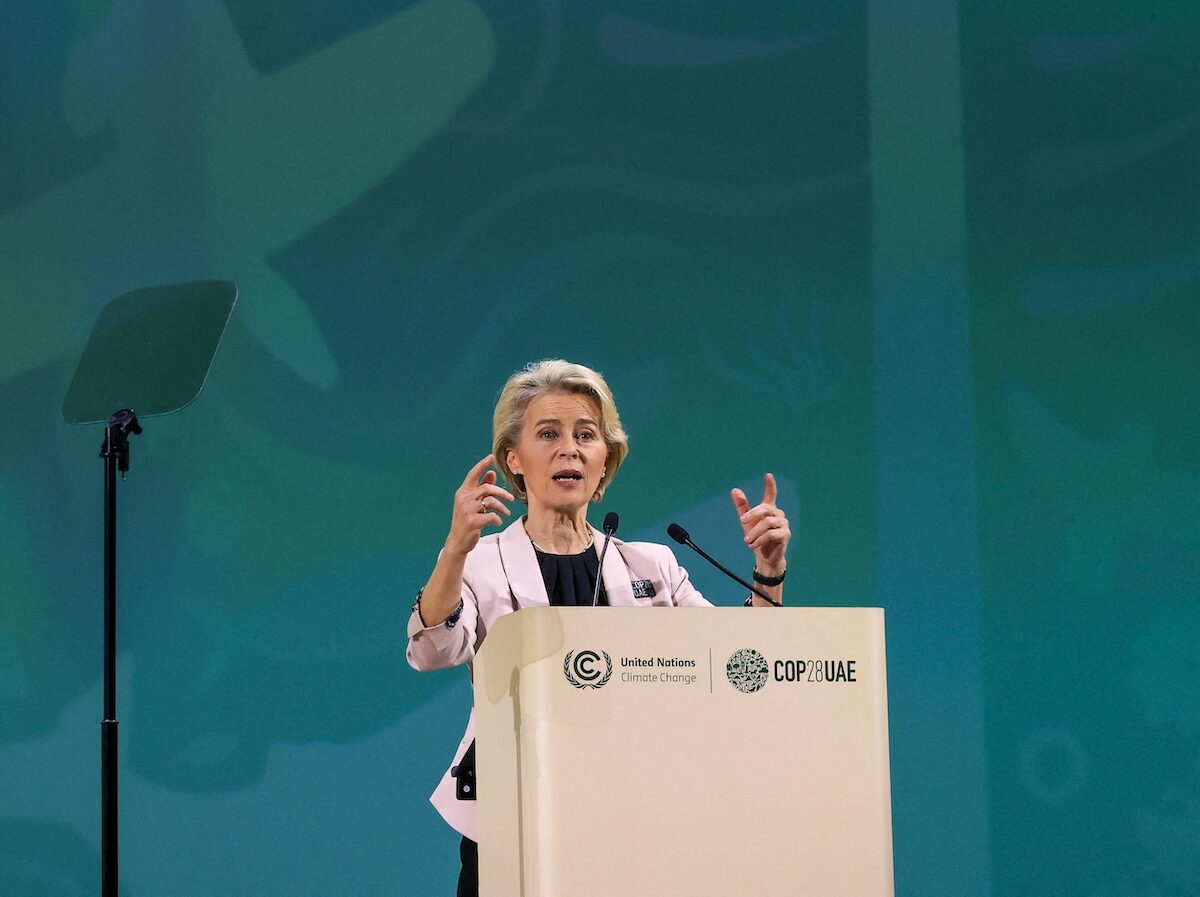COP28: Nearly 120 Nations Agree to Triple World’s Renewables Output

 Why you can trust us
Why you can trust us
Founded in 2005 as an Ohio-based environmental newspaper, EcoWatch is a digital platform dedicated to publishing quality, science-based content on environmental issues, causes, and solutions.
At the COP28 climate conference on Saturday, nearly 120 nations pledged to triple the output of renewable energy on the planet by 2030.
In Dubai, European Commission President Ursula von der Leyen, along with 118 countries and COP28 President Sultan al-Jaber, launched the Global Pledge on Renewables and Energy Efficiency at the World Climate Action Summit, a press release from the European Commission said.
“With this Global Pledge, we have built a broad and strong coalition of countries committed to the clean energy transition – big and small, north and south, heavy emitters, developing nations, and small island states,” von der Leyen said in the press release. “We are united by our common belief that to respect the 1.5°C goal in the Paris Agreement, we need to phase out fossil fuels. We do that by fast-tracking the clean energy transition, by tripling renewables and doubling energy efficiency. In the next two years, we will invest 2.3 billion euros from the EU budget to support the energy transition in our neighbourhood and around the globe.”
The initiative was first proposed by von der Leyen in April at the Major Economies Forum in accordance with the European Green Deal. It sets targets to triple the capacity of installed renewable energy globally to a minimum of 11 terawatts (TW), as well as to double the rate at which improvements to worldwide energy efficiency are made from approximately two percent to four percent annually by 2030. Honoring the targets will help with phasing out fossil fuels and supporting the transition to decarbonization of the global energy system.
“This pledge and this financial support will create green jobs and sustainable growth by investing in technologies of the future. And, of course, it will reduce emissions which is the heart of our work at COP28,” von der Leyen added.
The pledge was led by the European Union (EU), the United Arab Emirates and the United States, reported Reuters. Other backers included Brazil, Barbados, Chile, Nigeria, Japan, Australia and Canada.
The global pledge was developed in cooperation with the International Energy Agency, the European Commission, the International Renewable Energy Agency and the presidency of COP28, according to the press release.
The EU is asking for the phasing out of fossil fuels with concrete actions throughout global energy systems. Language that reflects this goal is the top priority for the bloc at the climate summit.
The pledge came along with other announcements related to the decarbonization of energy, which is responsible for about three-quarters of greenhouse gas emissions worldwide, Reuters reported. The commitments included reducing methane emissions, expanding nuclear energy and putting a stop to the private financing of coal.
“This can and will help transition the world away from unabated coal,” said al-Jaber, as Reuters reported.
Each year, a review of developments contributing to achieving the goals of four percent yearly improvement related to energy efficiency and 11 TW will be released before the COP conference, the press release said.
The European Commission will work closely with financial institutions like the European Bank for Reconstruction and Development as well as the European Investment Bank in order to stick with its commitments to the pledge.
Countries especially vulnerable to climate change insisted that the goals of the pledge be made alongside a deal for COP28 nations to phase out fossil fuels.
“It is only half the solution. The pledge can’t greenwash countries that are simultaneously expanding fossil fuel production,” said Tina Stege, Marshall Islands climate envoy, as reported by Reuters.
Room must be made for renewables, argued Kaisa Kosonen, head of the COP28 delegation for Greenpeace, as AFP reported.
“The future will be powered by solar and wind, but it won’t happen fast enough unless governments regulate fossil fuels out of the way,” Kosonen said.
Subscribe to get exclusive updates in our daily newsletter!
By signing up, you agree to the Terms of Use and Privacy Policy & to receive electronic communications from EcoWatch Media Group, which may include marketing promotions, advertisements and sponsored content.

 233k
233k  41k
41k  Subscribe
Subscribe 




